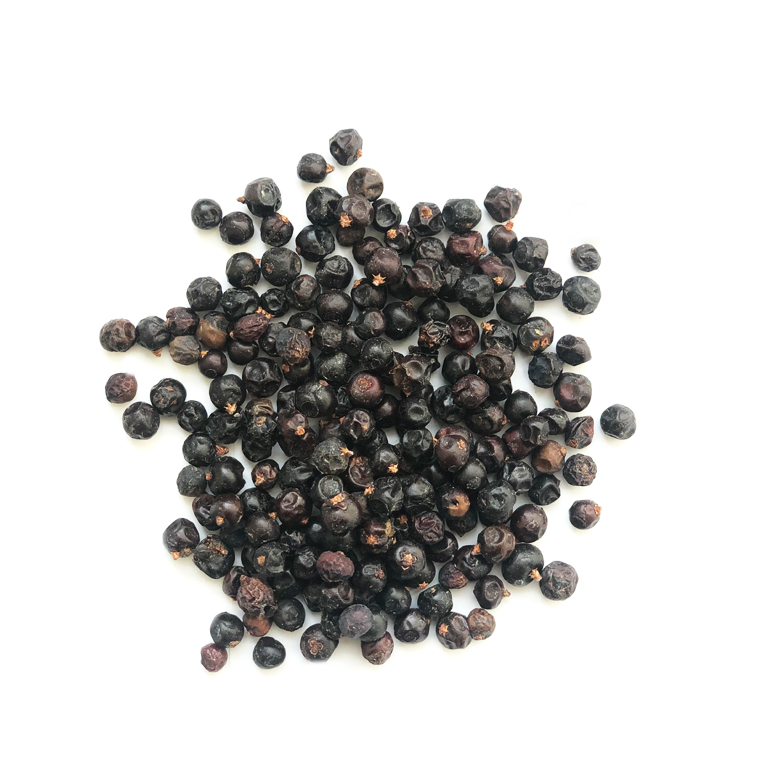-
Description
The Common Juniper is a low lying plant that is one of the most widely spread trees throughout the Northern Hemisphere. The branches of this shrub have tiny scale like needles and produce light blue and purple flesh like cones – known as the Juniper Berry.
Although it can be harvested any time of the year, only the blue matured cones of the Juniper Plant should be collected for food. The berry can take two to three years to fully ripen which makes a harvest that much more special! Did you know that ours is wildly foraged in the Balkans?
Juniper berries have been favoured throughout history for its many unconventional applications.
In medieval times Juniper smoke was believed to aid in clairvoyance and burned for the ritual purification. Juniper was seen as a protective herb and was used to ward off witchcraft and black magic.
In central Europe, Juniper was burned during outbreaks of the Plague as people believed it would help to expel the disease by fumigation.
Aside from providing a list of historical values, Juniper Berries are rich in Vitamin C and antioxidants.
-
Directions
For a quick winter warming tea steep 1/2 tablespoon of Juniper Berries with 2 cups of hot water for 10 minutes before straining. Add honey as desired.
-
Uses
Due to the berry’s strong flavour and aromas of evergreen and citrus, it is ideal to use in all types of dishes from sweet to savoury, meat or vegetarian and even in cosmetics and aromatherapy.
- The berries can be eaten dried, fresh, chopped, or powdered
- Try making Smreka – a traditional Balkan beverage made from fermenting dried Juniper Berries with fresh lemons and honey
- Use it in a curing or pickling mix to add a spicy, evergreen flavour.
- Add dried Juniper Berries to marinades and spice rubs especially for game meats such as Venison and Rabbit. Tip: Start with 10 berries per pound of meat
- Use Juniper Berries to add a complex flavour when making Sauerkraut
- Combine Rosemary, Juniper Berries, and Blackberries with 2 ounces of Gin and 4 ounces of Tonic to make a unique cocktail
- Combine Juniper Berries and a Pine sprig with 4 ounces of Prosecco to make a winter celebratory drink
- Steep crushed Juniper Berries in almond oil to create a tranquil foot rub
- Add crushed Juniper Berries to sugar cookies and pound cakes to make a special holiday treat -
Storage
Air and moisture can affect the quality of Juniper. Use airtight containers or sealable plastic bags to store the juniper berries. It will keep the moisture away and will keep them fresh for a long time.
-
Recipes & Posts
| SKU | Unit Size |
|---|---|
| 80811 | 3 x 50 g |
| 80816 | 5 kg BULK |
-
Description
-
Directions
-
Uses
-
Storage
-
Recipes & Posts
-
The Common Juniper is a low lying plant that is one of the most widely spread trees throughout the Northern Hemisphere. The branches of this shrub have tiny scale like needles and produce light blue and purple flesh like cones – known as the Juniper Berry.
Although it can be harvested any time of the year, only the blue matured cones of the Juniper Plant should be collected for food. The berry can take two to three years to fully ripen which makes a harvest that much more special! Did you know that ours is wildly foraged in the Balkans?
Juniper berries have been favoured throughout history for its many unconventional applications.
In medieval times Juniper smoke was believed to aid in clairvoyance and burned for the ritual purification. Juniper was seen as a protective herb and was used to ward off witchcraft and black magic.
In central Europe, Juniper was burned during outbreaks of the Plague as people believed it would help to expel the disease by fumigation.
Aside from providing a list of historical values, Juniper Berries are rich in Vitamin C and antioxidants.
-
For a quick winter warming tea steep 1/2 tablespoon of Juniper Berries with 2 cups of hot water for 10 minutes before straining. Add honey as desired.
-
Due to the berry’s strong flavour and aromas of evergreen and citrus, it is ideal to use in all types of dishes from sweet to savoury, meat or vegetarian and even in cosmetics and aromatherapy.
- The berries can be eaten dried, fresh, chopped, or powdered
- Try making Smreka – a traditional Balkan beverage made from fermenting dried Juniper Berries with fresh lemons and honey
- Use it in a curing or pickling mix to add a spicy, evergreen flavour.
- Add dried Juniper Berries to marinades and spice rubs especially for game meats such as Venison and Rabbit. Tip: Start with 10 berries per pound of meat
- Use Juniper Berries to add a complex flavour when making Sauerkraut
- Combine Rosemary, Juniper Berries, and Blackberries with 2 ounces of Gin and 4 ounces of Tonic to make a unique cocktail
- Combine Juniper Berries and a Pine sprig with 4 ounces of Prosecco to make a winter celebratory drink
- Steep crushed Juniper Berries in almond oil to create a tranquil foot rub
- Add crushed Juniper Berries to sugar cookies and pound cakes to make a special holiday treat -
Air and moisture can affect the quality of Juniper. Use airtight containers or sealable plastic bags to store the juniper berries. It will keep the moisture away and will keep them fresh for a long time.
